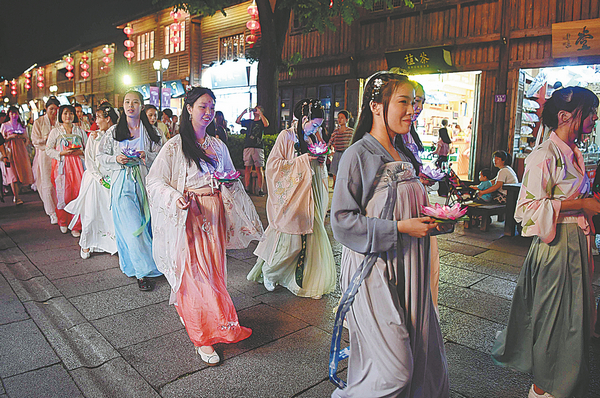

In the second five days of Dashu, the sultry weather oppressed and the soil absorbed moisture, as ancient Chinese people observed. Even if wind blows occasionally, it is only sweltering worse as if people were literally living in a steamer.
The moon will start to wane once it waxes, as Chinese people often say. In the last five days of this hottest period of the year, thunderstorms finally strike, cooling the air and announcing the end of hot days.
With much heat and rainfall, Dashu sees rice, cotton and maize enter the fastest-growing phase. However, it is also a time when natural disasters such as drought, flood or typhoons frequent, a challenging time for farmers.
In the north, farmers know that "Green onion fears rainfall, leek is afraid of sunshine, but rainfall in futian (dog days) benefit the growth of wheat," as the proverb goes.
"Rainfall is important for crops during this period of time. My mother used to say 'Rainfall in Dashu promises a good harvest for rice'. No rain, no rice," says Li Yuehua, 69-year-old retired teacher in Suqian, East China's Jiangsu province, who used to live in the countryside.
Born into a farmer's family, Li has learned proverbs from her parents, which had been used to instruct their work. "If there is a draught during Dashu, irrigate as soon as possible," she says, adding that "when Dashu arrives, sow the seeds of mustard. Sow beans before Xiaoshu (the Minor Heat) and mustard before Dashu."
For 29-year-old Yang Liu in Suqian, among the unforgettable summer nights when she was little were those when she and her sisters lay under the starry skies and listened to adults tell stories of Niulang and Zhinyu while trying to recognize in the Milky Way the stars of Zhinyu (Vega) and Niulang (Altair), and the constellation of Jiang Taigong, (a famous sage during the Shang Dynasty (c. 16th century-11th century BC)) Diaoyu (literally Jiang Taigong is fishing, or the Scorpio).